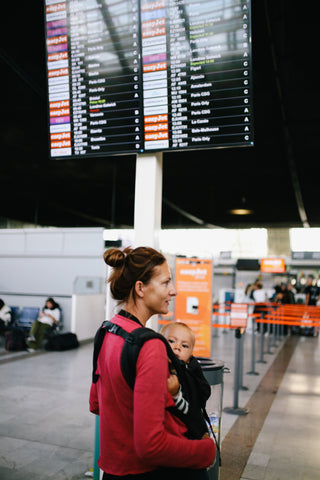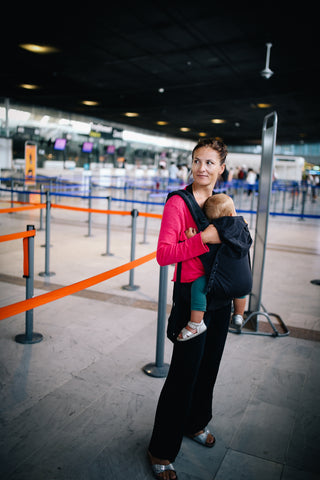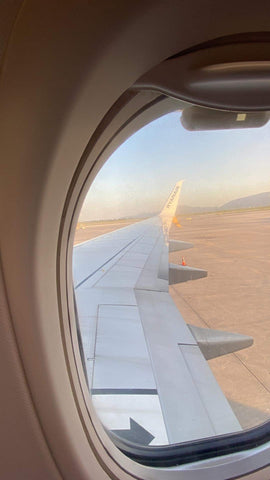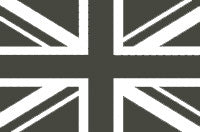
photo by @kkaraim
Traveling with your baby is an adventure unlike any other, but it comes with its fair share of questions and challenges. From when to start flying with your little one, or how to plan your journey to packing essentials and navigating the airport, we've got you covered.
When is the best time to start flying with a baby?
The ideal age to start flying with your baby is a common concern among parents. There are no strict regulations, but various factors should influence your decision. According to NCT infants must be at least two weeks old before they can travel although some airlines allow seven-day old infants on board. It's advisable to check with your airline regarding weight or age limits. Keep in mind that some airlines may require a fit-to-fly letter from your doctor if your baby is under two weeks old.For mothers who underwent a c-section, it's advisable to wait until after their six-week postnatal check-up before considering air travel, and consulting with a healthcare professional is always prudent. Your baby's stage of development and overall health are crucial factors in determining their readiness for flying. It's advisable to consult with your pediatrician if you have any concerns, and this advice also extends to older children dealing with issues like stomachaches or infections.
Additionally, waiting a month before flying can offer benefits, allowing you and your baby to settle into your new routine. This period of adjustment is particularly important as newborns are more susceptible to germs during their first four weeks, making it a wise choice, especially before their initial vaccinations.
What to Bring on the Plane ?
Packing for a flight with a baby requires careful planning. Here are some essential items for your hand luggage to ensure a smooth trip:
- Diaper Bag: Pack it with nappies, wet wipes, and disposable sacks. Include a compact wash bag to avoid taking your entire hand luggage to the restroom due to limited space.
- Extra Clothing: Bring extra clothing for your baby and yourself. This will come in handy if your baby spills a drink during turbulence or experiences increased dribbling during the flight.
- Dirty Clothes Bag: Pack a bag for dirty clothes to keep your hand luggage fresh.
- Pacifiers: Bring a few sterilized pacifiers if your baby uses them. Sucking can help equalize ear pressure during take-off and landing.
- Blanket: Include your baby's blanket for its comforting scent.
- Cloths: Pack some cloths for cleaning up spills or accidents.
- Baby milk formula and Food: Ensure you have sufficient formula milk for bottle-feeding and food if your baby has started solids for the journey. Snacks can be a great way to keep little ones entertained on a plane if they've begun eating solid foods.
- Toys and Books: Pack toys and books for entertainment. Consider mess-free coloring, reusable stickers, and suction cup fidget spinners; they're our favorites. Be sure to check hand luggage rules well in advance. Most airlines offer free carriage of prams or pushchairs.

Can you take baby food on a plane?
According to Gov.uk, when you travel with a baby, you can bring sufficient baby food, baby milk, and sterilized water for the journey in your hand luggage. There's no specific legal limit on the quantity, but we advise confirming with your airport beforehand, as some may have their own regulations.
You're allowed to transport breast milk in your hand luggage, even without a baby. Nevertheless, it's crucial to be aware that frozen breast/chest milk is not allowed in hand luggage.
Each container carrying breast/chest milk must not exceed 2,000ml in volume. These containers will undergo screening at the security checkpoint, and airport personnel may have to open them for liquid screening.
How do I travel through the airport with my baby?
When traveling with your baby, you have several convenient options. One of the simplest is using a baby carrier, allowing you to keep your little one close and settled during the flight. The forward-facing position in the carrier is ideal for in-flight use granting you the freedom to use your hands for various tasks such as:
- visiting the restroom,
- having your inflight meal,
- or tending to other children.
Some airports may even permit you to keep your baby in the carrier while passing through security scanners, which can be helpful if your baby is asleep or feeling overwhelmed, though this is subject to the airport's discretion.
Alternatively, you can consider bringing a baby car seat. Even if you don't plan to use it during the flight, it can be beneficial for your trip. Most airlines allow you to check a car seat into the hold for free, in addition to your regular baggage allowance. This policy applies to toddler car seats, booster seats, and infant carriers.
Traveling with a baby is an exciting adventure that may require a few adjustments, but trust us, you can conquer almost any destination with your little one in tow! Keep your cool, banish worries, and remember, you've got this. We're confident that armed with this knowledge, you'll embark on your holiday well-prepared and completely at ease.


